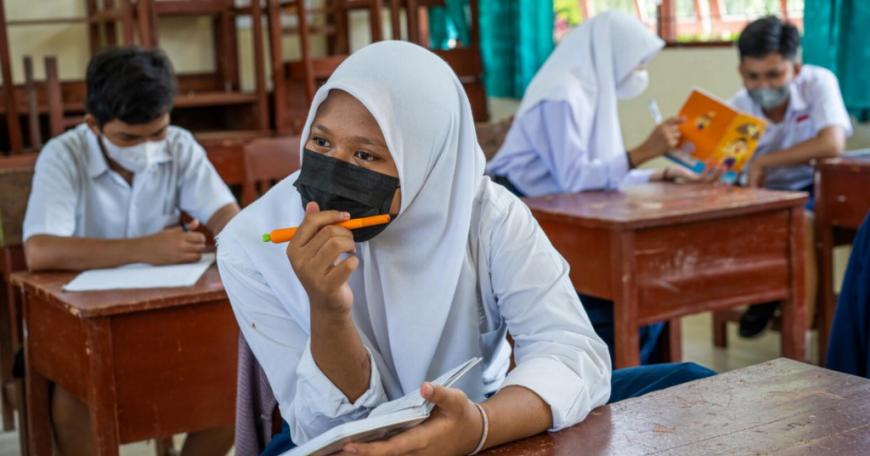
Championing innovations in education at Expo 2020 Dubai
J-WEL and J-PAL bring evidence-based approaches to global challenges in education
From Dec 13–15, Expo 2020 Dubai staged its flagship education event, the RewirEd Summit, hosted by Dubai Cares and the United Arab Emirates (UAE) Ministry of Foreign Affairs and International Cooperation. Representatives from two groups at MIT — the Abdul Latif Jameel Poverty Action Lab (J-PAL), and the Abdul Latif Jameel World Education Lab (J-WEL) — participated in the summit to advocate for innovative approaches to education.
Scaling innovations for foundational learning
J-PAL and Pratham, a leading Indian education foundation, co-hosted a panel discussion on key learnings for scaling innovative, evidence-based education programs, highlighting the Teaching at the Right Level approach implemented in India and across Africa.
This event coincided with the launch of the Foundational Learning and Numeracy (FLN) Hub, a digital toolkit to help build foundational skills for children. UNICEF, in partnership with J-PAL, Pratham, and Delivery Associates, and with support from the World Bank and Global Partnership for Education, created the FLN Hub to provide evidence-based guidance on improving the capacity of education systems to deliver on children’s foundational learning success.
J-PAL Global Executive Director Iqbal Dhaliwal said, “Today, the world is facing a learning crisis. The new FLN Hub represents an important step forward in making evidence-based education resources more accessible to a broad audience, from policy makers to school administrators, teachers, and parents, to help ensure that all children gain the skills they need to succeed.”
The FLN Hub was developed in response to the stresses that Covid-19 has put on educational systems. Pre-pandemic, almost 400 million primary school-aged children worldwide lacked basic literacy skills, with girls at higher risk of losing the skills they gained after leaving school. This has only been exacerbated by school closures that have affected over one billion children during the pandemic, leading to lost learning and increased inequity across education systems worldwide. In addition to providing resources, the hub serves as a platform for policy makers and practitioners to strengthen collaborations to expand learning opportunities for all children.
In addition, J-PAL Africa and Pratham shared their learnings on scaling learning interventions in a panel titled “The Journey to Scaling Education Interventions.” They highlighted lessons from the last 10 years of scaling the Teaching at the Right Methodology in Africa, including the importance of deep contextualisation paired with iterative learning, as well as embedding ownership in existing systems and building with local partners from the start.
Compassionate learning in refugee settings
On the same day, an event hosted by Save the Children, the Aga Khan Foundation and PLAN highlighted Transforming Refugee Education towards Excellence (TREE), a systems-wide teacher training program by J-WEL and Save the Children focused on using compassion to help teachers overcome trauma and deliver effective teaching. TREE is being piloted in Jordan, with support from the Jordanian Ministry of Education, Dubai Cares, Hikma, and Community Jameel, and will focus on supporting Jordanian teachers, students, and Syrian refugee children.
Open learning for the Arab world
J-WEL also joined the Abdulla Al Ghurair Foundation for Education (AGFE), the American University of Beirut, and Community Jameel to host a roundtable on how open learning — the movement to dismantle barriers to education and research — can transform universities across the Arab world into engines of innovation and economic growth.
With millions of refugees and displaced persons, in addition to the impact of Covid-19, the Arab region is facing an urgent demand for more flexible and accessible methods of education that can meet the unique learning needs of its communities.
Despite the solutions offered by introducing open learning systems — from new technologies and approaches to learning, to accreditation and access to resources — the ecosystem remains dominated by western educational institutions with little representation from the region.
Dr. Vijay Kumar, Executive Director of J-WEL at MIT, said: “As the experiences of MIT and other institutions around the world have shown, open educational initiatives offer great promise for advancing quality education at scale — from providing extensive access to educational resources to creating flexible learning pathways for diverse learners. The roundtable at the RewireEd Summit will be an important forum to discuss and develop strategies for sustainable support for open education as a vehicle for innovative transformation of education in the Arab region.”
George Richards, Director of Community Jameel, said: “Community Jameel is committed to advancing open learning in the Arab world, to unlock extraordinary potential by helping more people to learn in new ways and to shape their futures. The pandemic triggered a necessary shift towards open learning, accelerating developments in more flexible education, and we hope today’s meeting can carry forward this momentum and propel open learning into universities for the benefit of all.”
The panel built on a pre-meeting discussion held in November with leading higher education institutions from Iraq, UAE, Lebanon and Palestine. Delegates at this meeting agreed on the urgent need for their communities to develop better open resource materials.
A partner for innovation in education
Both J-PAL and J-WEL are supported by Community Jameel, the international organization founded by Mohammed Jameel ’78. With a strong commitment to strengthening education systems, Community Jameel is a partner on TREE, with J-WEL, and co-hosted the Dec 14 roundtable event at the RewirEd Summit. As well as J-PAL and J-WEL, Community Jameel established the Jameel-Toyota Scholarship at MIT in 1994 to provide financial support to undergraduate students from a catchment of countries, predominantly in Africa and Asia.
Championing innovations in education at Expo 2020 Dubai was originally published in MIT Open Learning on Medium, where people are continuing the conversation by highlighting and responding to this story.

